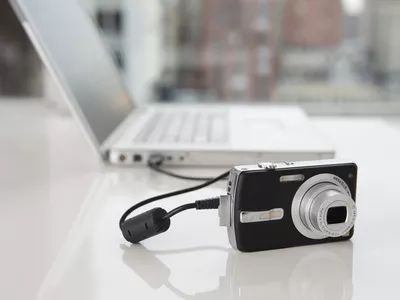
How to Migrate Android Data From Xiaomi Redmi Note 13 5G to New Android Phone? | Dr.fone

How to Migrate Android Data From Xiaomi Redmi Note 13 5G to New Android Phone?
While getting a brand new smartphone is certainly exciting, the process of phone migration is pretty tiresome. Too many times, users spend a lot of time and efforts to migrate Android to a new smartphone. If you wish to Android migrate to new phone without experiencing any data loss then you can take the assistance of a dedicated tool. There are plenty of ways to migrate Android to Android. In this guide, we will teach you how to migrate Android in three different ways.
Part 1: How to migrate Android using Google Drive?
Since Google Drive is already available on all the Xiaomi Redmi Note 13 5G devices, it can readily be used to migrate Android to Android without much trouble. Firstly, you need to sync your data from the source device and later log-in to the same account to sync your new phone with the Drive. To perform phone migration using Google Drive, follow these steps:
1. To start with, go to Settings > Backup & Reset on the source device and turn on the option of “Backup my Data”.
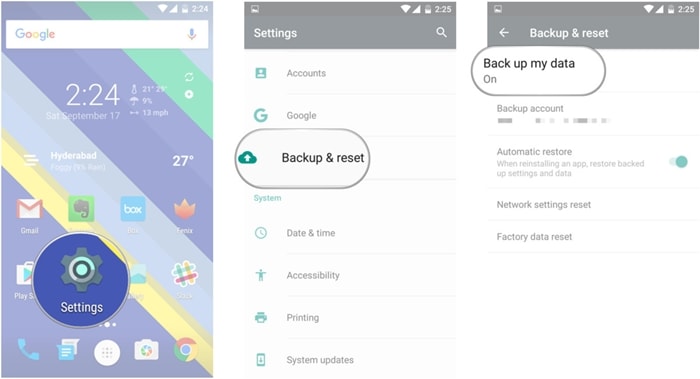
2. Furthermore, you can select the kind of data you wish to sync with your Google Drive. You can simply turn on the feature for Automatic backup to make the most of the space on Google Drive.
3. Wait for a while as your device will backup its content on the Drive. You can even go to your account’s Drive to view the backup.
4. Now, in order to Android migrate to new phone, simply turn on the target device and proceed to perform its setup.
5. Agree to the terms and conditions and sign-in to your Google account. Make sure this is the same account that is linked to your source device.
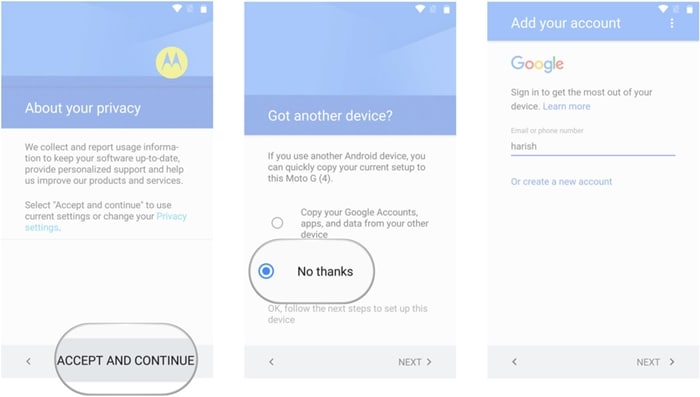
6. As you would sign-in to the account, it will display a list of available backup files. Simply select the recent backup file.
7. Furthermore, you can pick the apps that you wish to restore from here or restore all content at once.
8. To migrate Android to Android, just click on the “Restore” button and move your data from your old to new device.
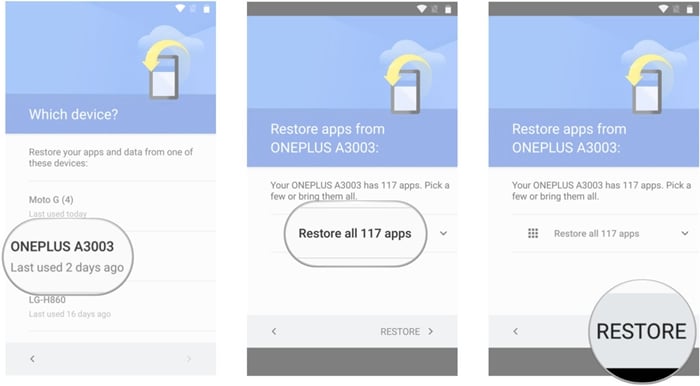
Part 2: How to migrate Android data using Dr.Fone - Phone Transfer?
One of the most secure and fastest ways to migrate Android device to another phone is by using Dr.Fone Switch . Compatible with all the major Android, iOS, and Windows devices, it can easily be used to perform phone migration between different platforms. The tool performs a direct phone to phone transfer. It can Android migrate to new phone all kinds of data like contacts, call logs, bookmarks, messages, photos, videos, music, and more. To migrate Android to Android with no data loss, perform these steps:
Dr.Fone - Phone Transfer
Migrate Android Data to New Android Phone in 1 Click.
- Easy, fast, and safe.
- Move data between devices with different operating systems, i.e iOS to Android.
- Supports iOS devices that run the latest iOS

- Transfer photos, text messages, contacts, notes, and many other file types.

- Supports over 8000+ Android devices. Works for all models of iPhone, iPad and iPod.
3981454 people have downloaded it
1. Firstly, download Dr.Fone - Phone Transfer on your Windows PC or Mac from its official website. In order to perform Android phone migration, connect your old and new device to the system and wait for them to be detected.
2. Launch Dr.Fone toolkit and select the option of “Switch” from the welcome screen. Make sure that both the Xiaomi Redmi Note 13 5G devices are connected to your system in a secure way.

3. This will provide the following interface. As you can see, Dr.Fone will intuitively detect the source and the target device. Though, you can click on the “Flip” button to interchange the position of the Xiaomi Redmi Note 13 5G devices as well.
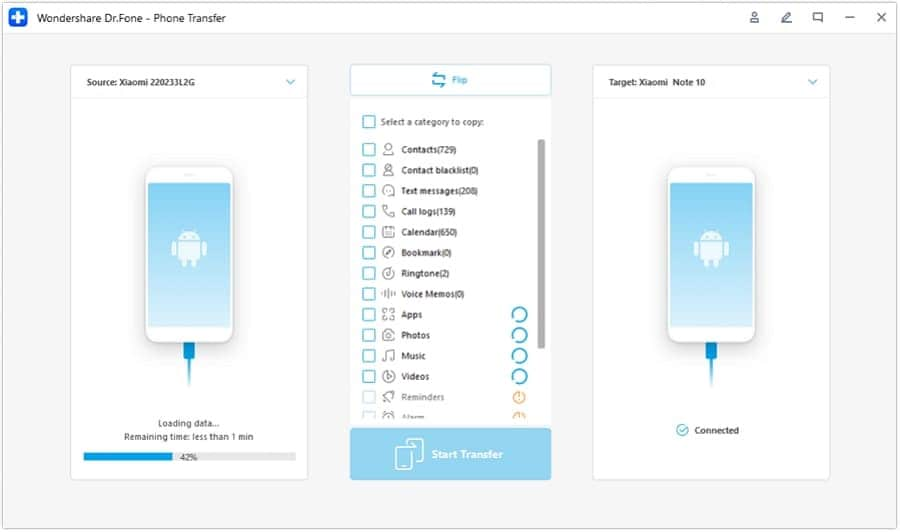
4. Select the kind of data you wish to move from the source to the destination device. You can even erase all the content on the target device by selecting the “Clear data before copy” option.
5. After selecting the type of data you wish to move, click on the “Start Transfer” button. This will initiate the phone migration process by moving your selected content to the target device.
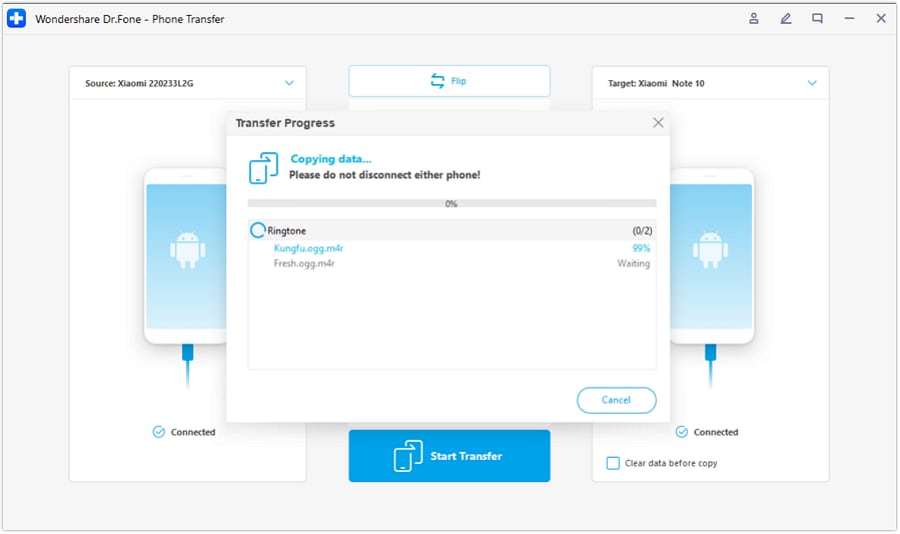
6. Wait for a while as Dr.Fone will migrate Android device to any other phone. Don’t close this window or disconnect the Xiaomi Redmi Note 13 5G device during this stage.
7. Once your Android migrate to new phone, you will be notified by displaying the following prompt.
That’s it! After following these steps, you would be able to migrate Android to Android easily. Just disconnect your Xiaomi Redmi Note 13 5Gs safely and use them the way you like.
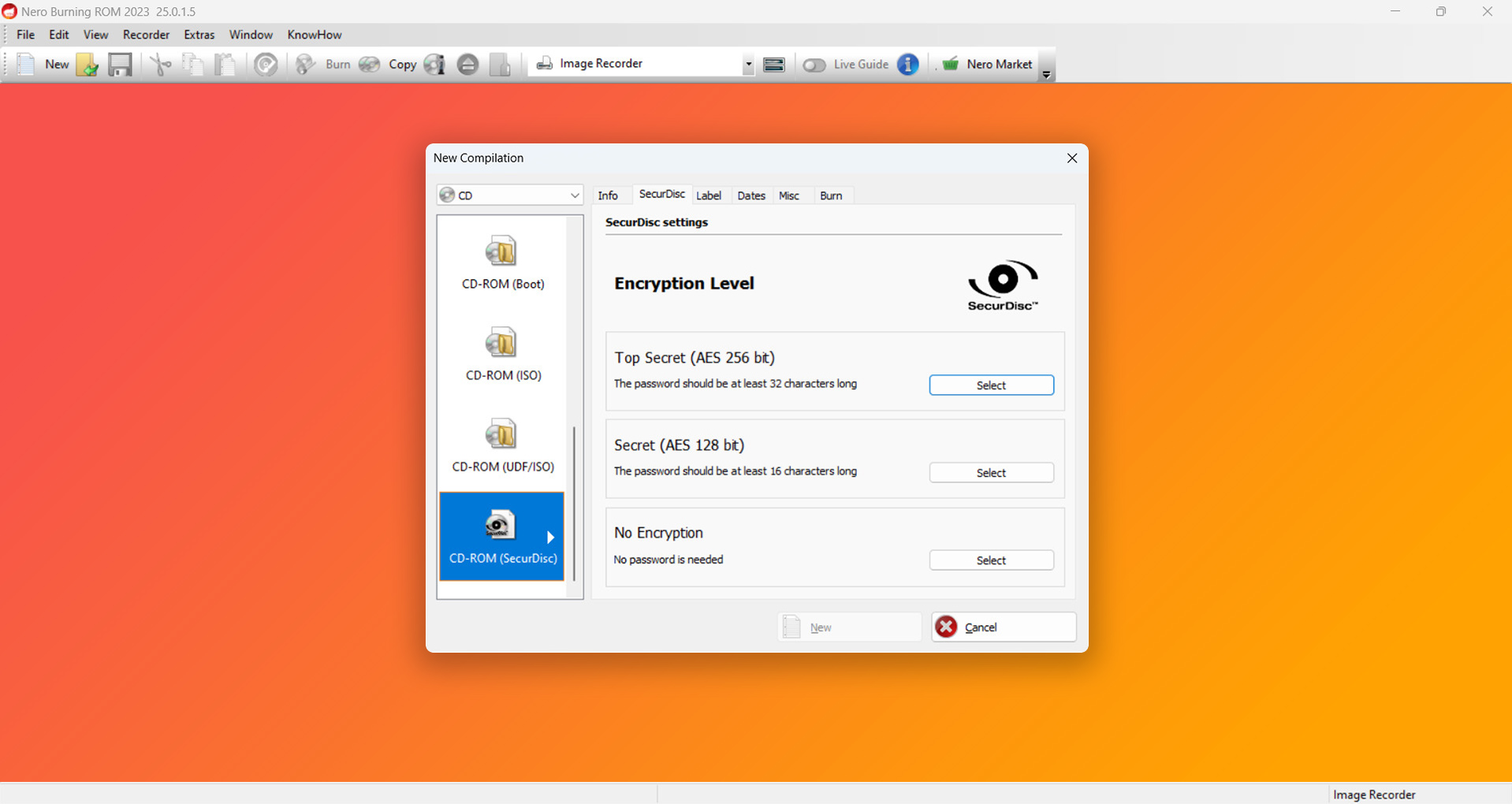 Nero Burning ROM:
Nero Burning ROM:
The ultimate burning program for all your needs!
Part 3: How to migrate Android data manually?
By using Dr.Fone Switch or Google Drive, you would be able to perform phone migration in an effortless manner. Nevertheless, if there is no free space on your Drive and you wish to manually migrate Android, then you can also make it work. Following are certain ways to migrate Android to Android using different tools and techniques.
Contacts, Gmail, Fit Data, Play Store, etc.
To migrate Android device’s crucial content like its contacts, Google Fit data, Google Play Store data, Music data, etc. you can go to the respective Account and turn on the sync option. Later, you can use the same account and sync these files to the new device.
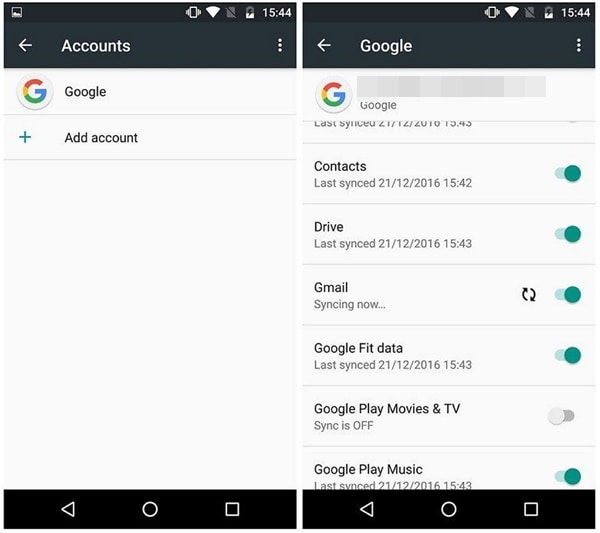
SMS transfer
There are plenty of ways to move your messages from one device to another. Just download a reliable SMS Backup & Restore app from Google Play store and sync your messages. Install the app on the new device to complete phone migration.
SMS Backup & Restore Download URL: https://play.google.com/store/apps/details?id=com.riteshsahu.SMSBackupRestore&hl=en
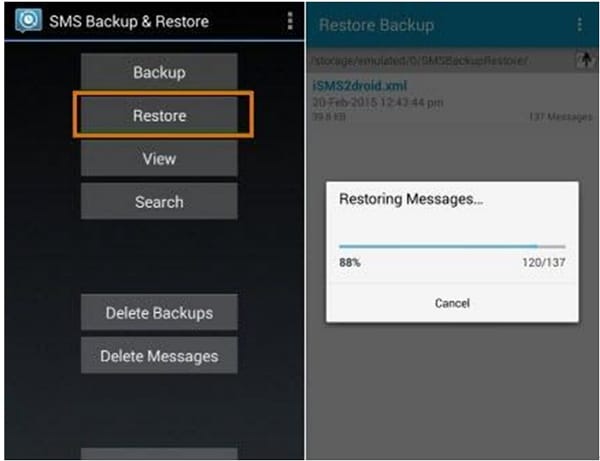
Media content
The smartest way to Android migrate to new phone your media files (like photos, videos, music, etc.) is by syncing them with Google Drive. If your Drive has limited free space, then you need to manually transfer this data. Connect your device to your system and open its storage. From here, you can manually copy the files having your media content and paste them to a safe location (or directly to the new device’s storage).
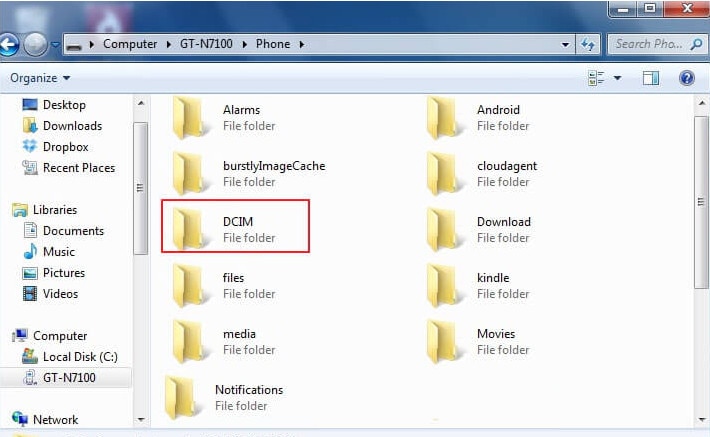
Transfer apps
You can also move your important apps while performing phone migration. There are dedicated third-party solutions that you can use for this. For instance, Helium can help you move your important apps and app data from one device to another.
Helium Download URL: https://play.google.com/store/apps/details?id=com.koushikdutta.backup&hl=en
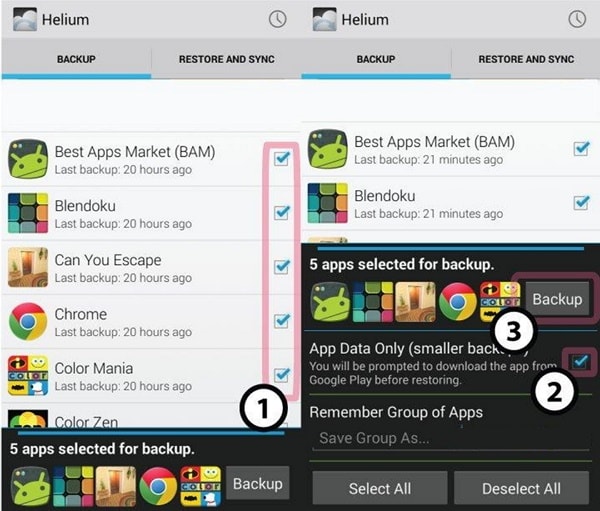
Bookmarks and passwords
If you use Google Chrome to store your passwords and bookmarks, then you can also migrate Android this content. Just go to Google Settings on the Xiaomi Redmi Note 13 5G device and turn on the option of “Smart Lock for Passwords”. In this way, you won’t have to enter your passwords over and over again.
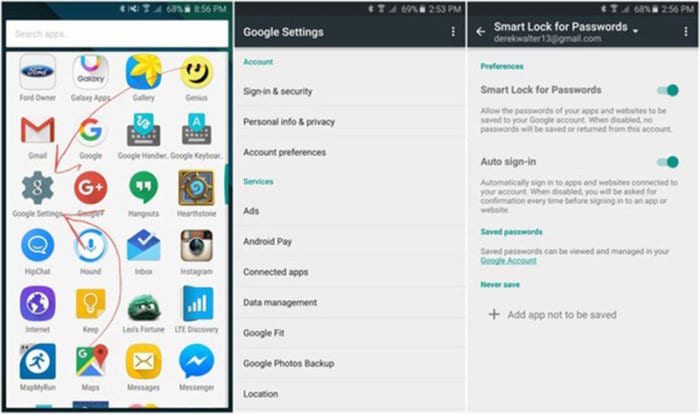
As you can see, the manual phone migration method will consume a lot of time and effort of yours. Therefore, we recommend using Dr.Fone Switch to migrate Android to Android without any data loss. It is a highly secure and reliable tool that will let you migrate Android to any other platform without any hassle.
How to Transfer Photos from Xiaomi Redmi Note 13 5G to Laptop Without USB
Moving your photos on a computer comes with lots of benefits. Among them is the larger screen itself, which allows you to inspect the image details in a more thorough manner. Another thing is that the computer also serves as a great backup storage for your dearly cherished photos. You can be sure that the image folders you create in the computer’s local memory are highly secure. Just organize each file with labels to avoid unnecessary confusion. Simply put, our computers have a lot to offer with regard to file organization and data management.
Many people assume that copying your files to a computer is a bit of a hassle. Well, it’s somewhat true unless you’re going to opt for wireless data transfer. Yes. That’s possible. There are many tutorials out there on how to copy files from your phone to your laptop without USB. Simply choose a particular method that works best in your situation.
In this article, we will provide a short guide on how to organize your computer files easily and quickly. We will also list down a few tutorials on how to transfer photos from your phone to your laptop without USB. Continue reading below to learn more.
How to Organize the Photos on Your Computer
While smartphones offer convenience for snapping photos on the go, viewing your pictures is doubtlessly much better on a computer. Why not? Computers apparently have larger screens that increase image quality to another level. However, finding a specific photo in your desktop storage can be a daunting experience if your files are unorganized. Don’t worry. Listed below are some useful organization techniques that can help you a lot in this regard.
Add the Image Folders to the Photos Application
Many operating systems have a built-in Photos application to help you organize and view your pictures more efficiently. You may use it to organize your photos in separate folders and create a centralized hub for browsing.
Add Tags to Your Photos
Tagging your photos is a versatile way to categorize and organize them based on themes, events, or people. Most photo management applications allow you to add descriptive tags that make it easy to search the media files later. This is particularly useful for quickly locating pictures of specific occasions or individuals.
Keep Your Photos in Separate Folders
Make it a habit to create separate folders for different events, locations, or time periods. This organization method helps you maintain a clear structure for your photo collection. For example, you might have folders for vacations, family gatherings, or special occasions. Organizing photos this way simplifies navigation and ensures that each set of pictures is kept properly.
Rename Your Photo
Give your photos descriptive and unique filenames that reflect either their content or context. Organizing your files by their respective labels helps you find them easily instead of relying solely on visual cues. Consider including dates, locations, or key details in the filenames to make your photos easily identifiable.
NOTE: By incorporating these organization techniques, you can surely enjoy your memory collection on the larger canvas of your computer screen. Take advantage of these methods to transform your digital photo library into a well-ordered and easily accessible archive. Moreover, these are prerequisites for the tutorials on how to transfer photos from your phone to your laptop without USB.
How to Transfer Photos From Phone to Laptop Without USB in Easy Steps
Copying photos from smartphones to laptops has become significantly more straightforward today than in the past. In fact, the entire data migration process can be completed within a few minutes. No need to resort to advanced interventions and external assistance. Just choose a particular tutorial below on how to transfer photos from your phone to your laptop without USB. Initiate each step carefully and complete the procedure in no time. Check out the list below to get started.
company, user or members of the same household. Action! - screen and game recorder</a>
Method 1: Transfer photos from phone to laptop using iCloud web
If you’re an Apple user, you can easily transfer photos from your phone to your computer via iCloud. Don’t worry. It’s a very simple data transfer procedure you can definitely complete with little to no effort. Here’s a short guide on how to transfer photos from your phone to your laptop without USB using iCloud.
- Step 1: First and foremost, make sure that your iPhone is syncing your photos to iCloud. To check it, go to Settings > Apple ID > iCloud > Photos. Toggle on the radio button next to Sync This iPhone.
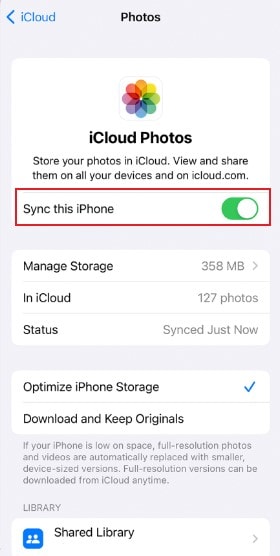
- Step 2: On your computer, launch the Browser.
- Step 3: Visit icloud.com. Once it fully loads up, click Sign In. Log in to the Apple ID account you’re currently using on your iPhone.
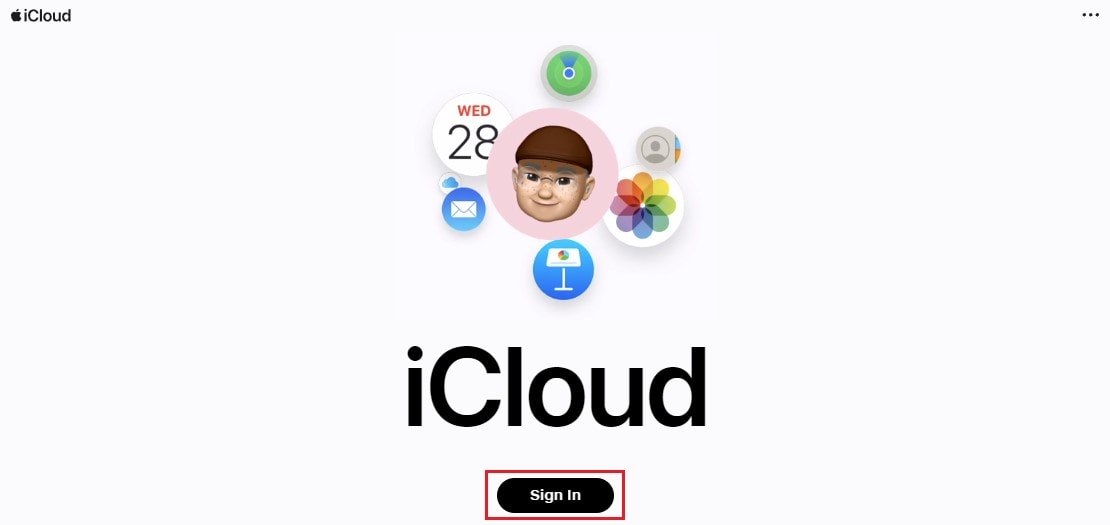
- Step 4: Click on the Photos icon.
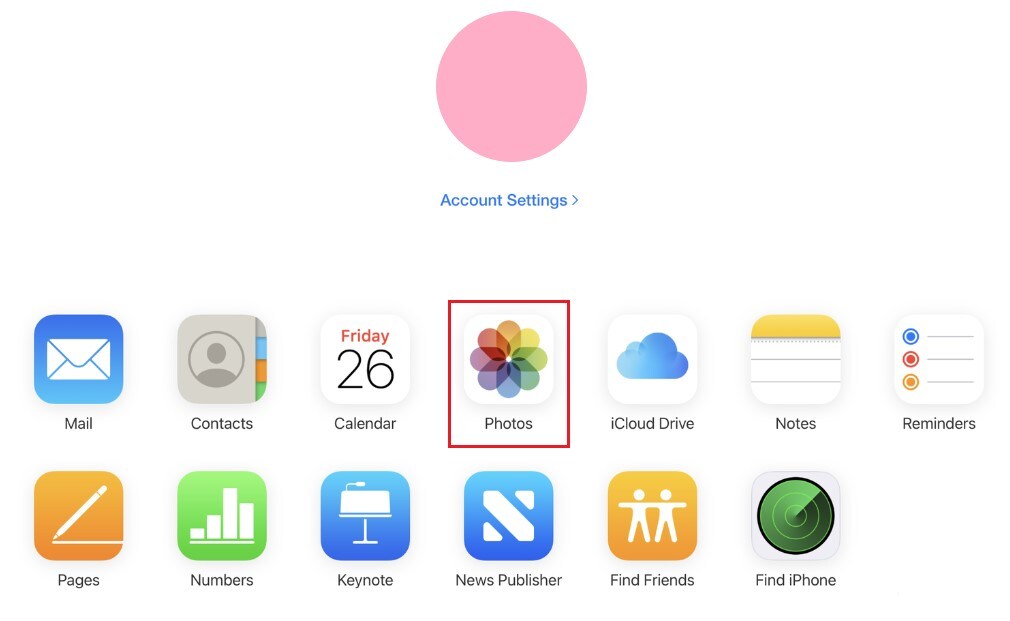
- Step 5: Select the photos you want to transfer to your computer. After that, click the Download icon at the top-right corner of your screen.
NOTE: How to transfer videos from your phone to your laptop without USB? This data migration technique also works in this regard.
Method 2: Transfer photos from phone to laptop using Google Photos
Google Photos is simply the iCloud’s substitute for Android smartphone. Like iCloud, you can sync your Android photos to Google Photos and access them from your computer. Don’t worry. It’s very easy to facilitate. Here’s how to transfer photos from your phone to your laptop without USB using Google Photos.
- Step 1: Before anything else, back up your Android smartphone first to Google Photos. Go to Google Photos > Profile icon > Turn On Backup. Once enabled, Google Photos will copy your photos from the local storage to the Google server.
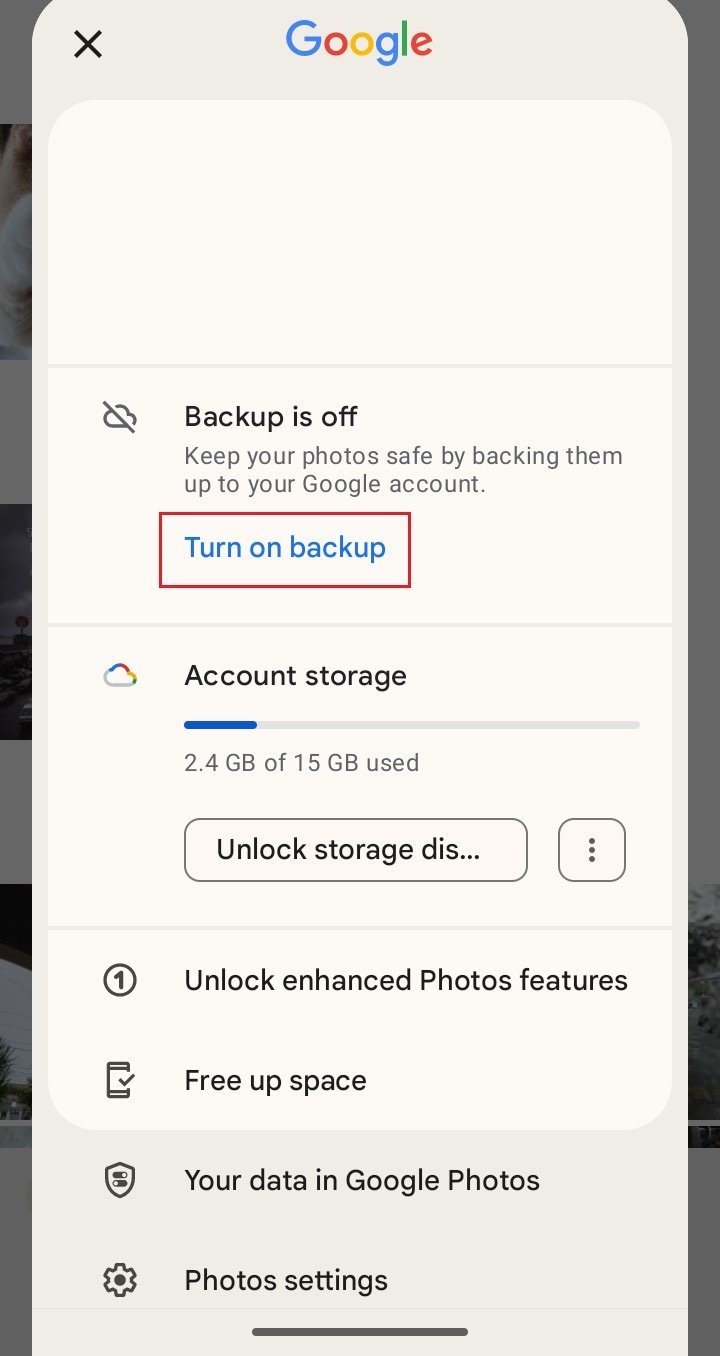
- Step 2: Launch the Browser on your computer. Go to google.com.
- Step 3: Click the Nine-dotted menu icon next to your profile. Make sure that you’re logged in to the same Gmail account you’re currently using on your smartphone.
- Step 4: Choose Photos.

- Step 5: Click the images you want to save on your computer. From there, click the Three-dotted menu icon. Find and click Download or press SHIFT + D on your keyboard.
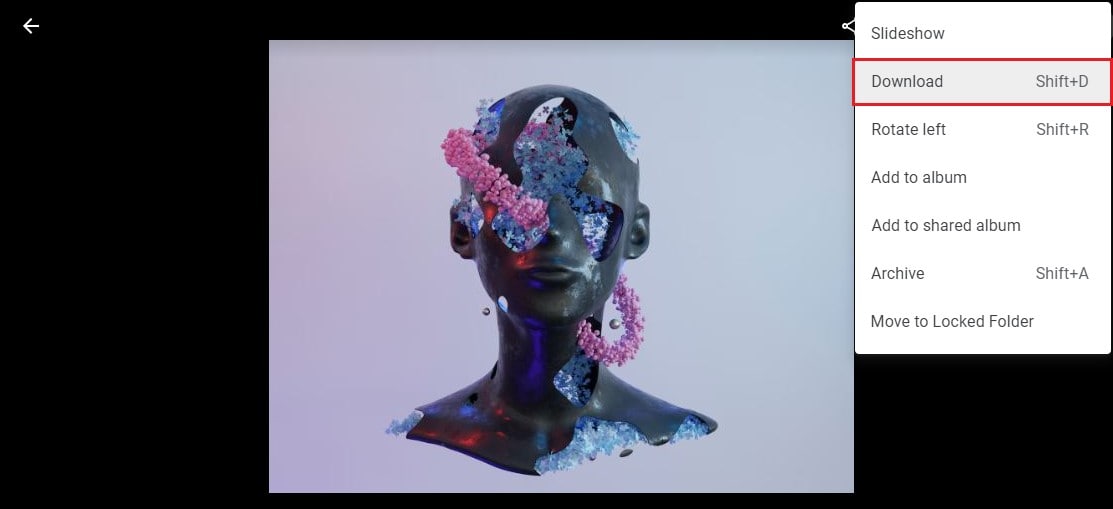
NOTE: How to transfer videos from your phone to your laptop without USB? This data migration technique also works in this regard.
Method 3: Transfer photos from phone to laptop using Bluetooth
Does your laptop have a Bluetooth connectivity feature? If so, try to use it for the photo transfer. Just connect your smartphone to the computer via Bluetooth and go ahead with the migration. Here’s a short guide on how to transfer photos from your phone to your laptop without USB via Bluetooth.
- Step 1: Turn on the Bluetooth connection on your smartphone and your computer.
- Step 2: On your smartphone, select the photos you want to transfer. Click on it.
- Step 3: Click Share.
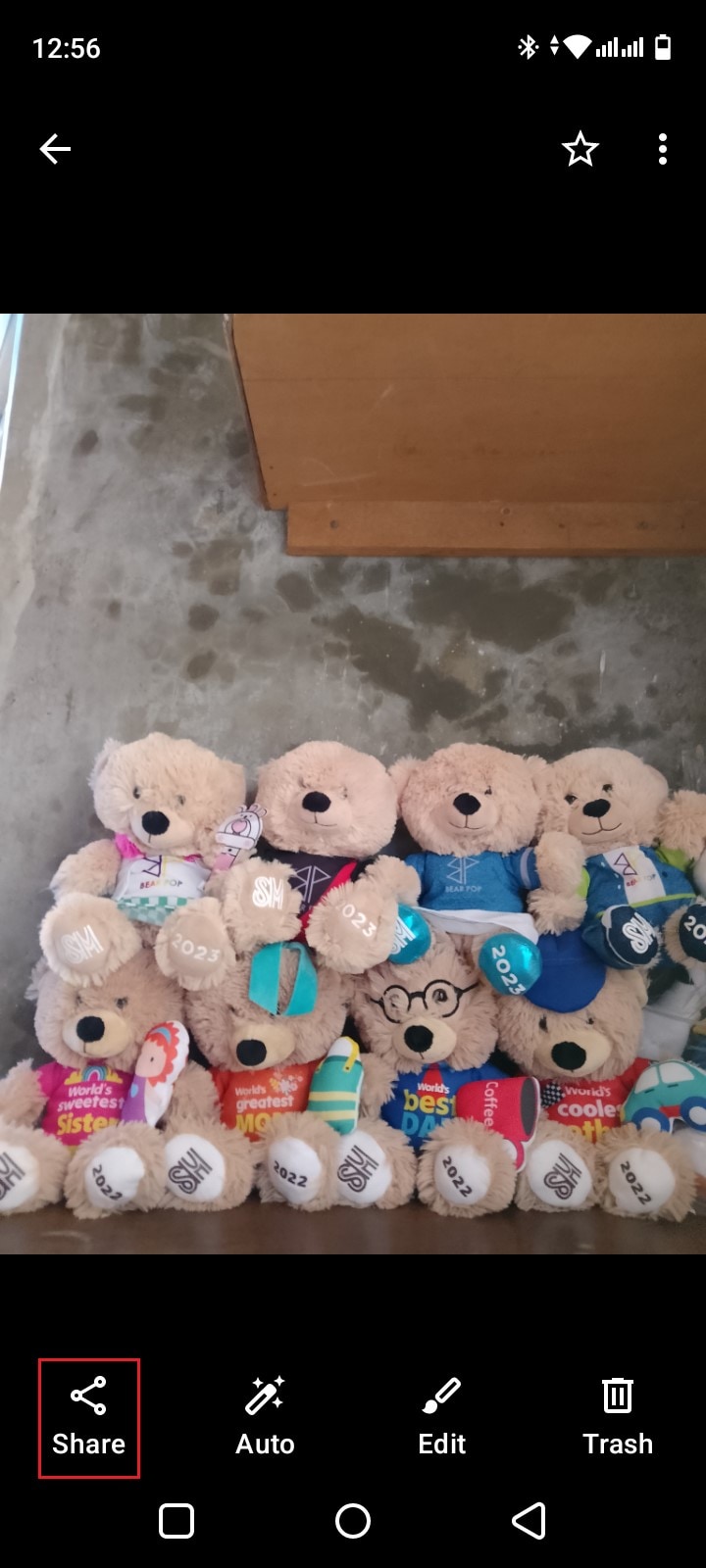
- Step 4: Click Bluetooth. Select your computer from the list. Then, click on it. Wait for the transfer to be completed in a few seconds.
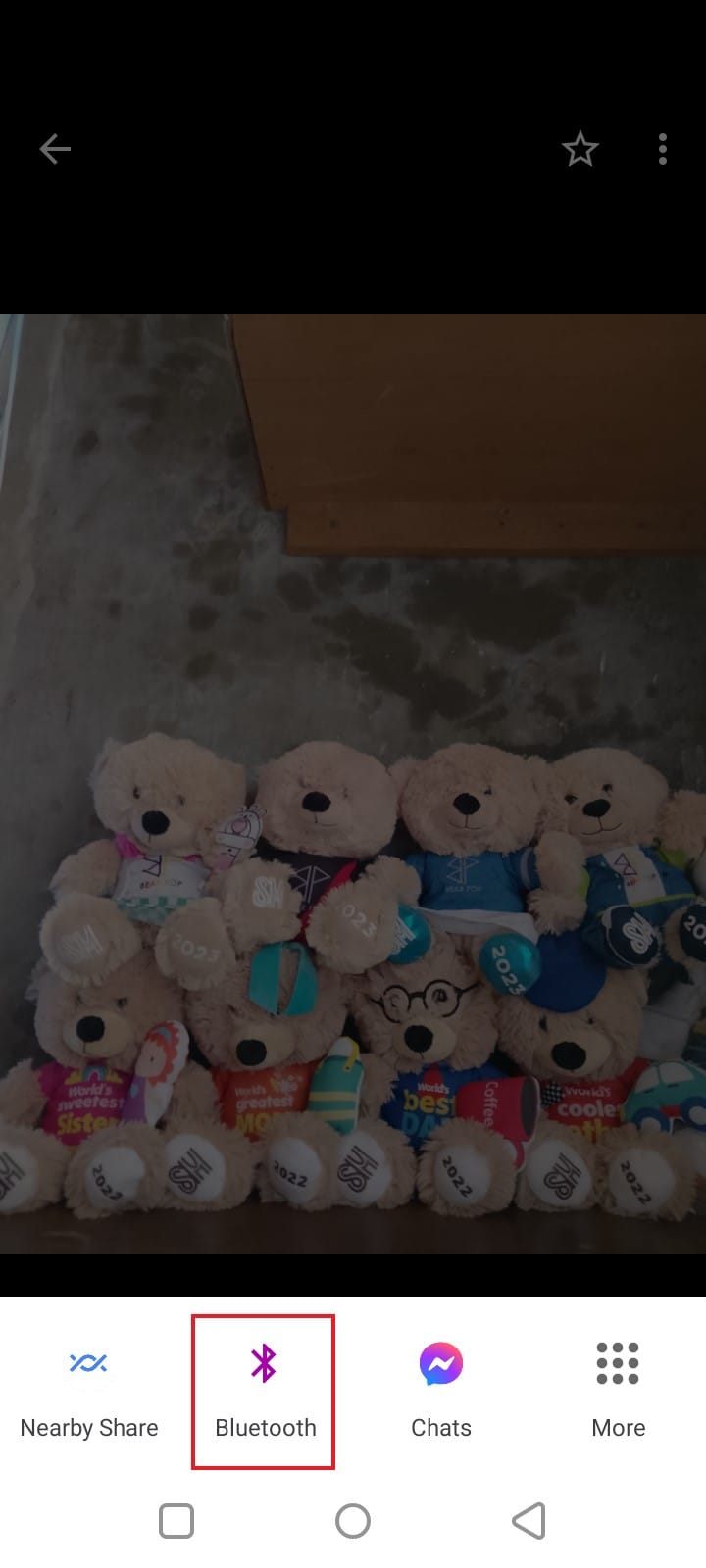
Method 4: Email the photos from the phone to the laptop
If you’re only sending a few photos to your laptop, emailing them from your smartphone will certainly work great. Here’s how to transfer photos from your phone to your laptop without USB via email.
- Step 1: Launch the Gmail application on your smartphone. From there, click Compose.
- Step 2: Key in the recipient’s email address to the To field. Make sure that it is currently logged in to the browser on your computer.
- Step 3: Click the Attachment icon on the top-right corner of your screen. After that, choose the photos you want to transfer.
- Step 4: Click the Send button.
- Step 5: On your computer, launch the browser and sign in to the Gmail account delegated as the receiver of the transfer.
- Step 6: Find and click the Email to view them. From there, hover the mouse cursor over the photo attachment you want to download. Lastly, click the Download icon.
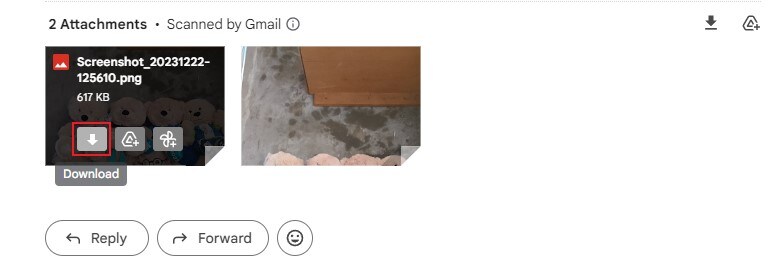
NOTE: How to copy files from your phone to your laptop without USB? This data migration technique also works in this regard.
 Lyric Video Creator Professional Version
Lyric Video Creator Professional Version
Method 5: Transfer photos from phone to laptop using AirDrop
Are you using an iPhone and a Macbook? No problem. You may use AirDrop to move your photos between these two devices. Here’s a short guide on how to transfer photos from your phone to your computer without USB via AirDrop.
- Step 1: Activate AirDrop on your iPhone and Macbook.
- Step 2: On your iPhone, go to the Photos application.
- Step 3: Choose the media files you want to transfer. After that, click the Share icon at the bottom-left corner of your screen.
- Step 4: Choose AirDrop.
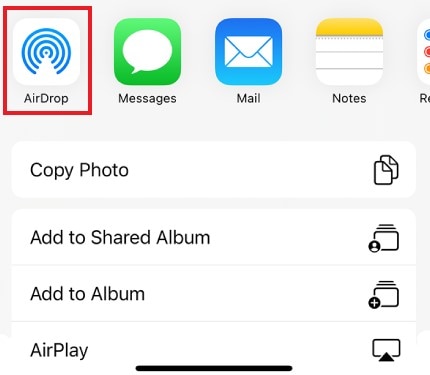
- Step 5: Select your Macbook as the recipient.
- Step 6: On your Macbook, click Accept.
BONUS TIP: How to Copy Files From One Smartphone to Another?
As a bonus, it is important to know that transferring files from one device to another in a secure environment is significant. It safely copies the documents and lowers the risk of data loss and corruption.
With the holidays fast approaching and the abundance of noteworthy photos, videos, and moments coming your way, having a steadfast solution is crucial. This is where Wondershare brings a compact yet efficient tool to help you. Wondershare Dr.Fone lets you quickly transfer photos and files to another mobile device in no time. To back this up, here is a quick, comprehensive guide on how to do it in a few simple steps.
Suppose you’re upgrading to an IOS device and need a quick way to transfer files from your old Android device. Then here’s your go-to guide using Wondershare Dr.Fone.
- Step 1: Open Wondershare Dr.Fone on your computer and navigate to the Toolbox section. Select the Phone Transfer tool.

- Step 2: Once opened, set the Source and Destination devices for the data transfer. Use the Flip button to change the transfer direction between the Xiaomi Redmi Note 13 5G devices.
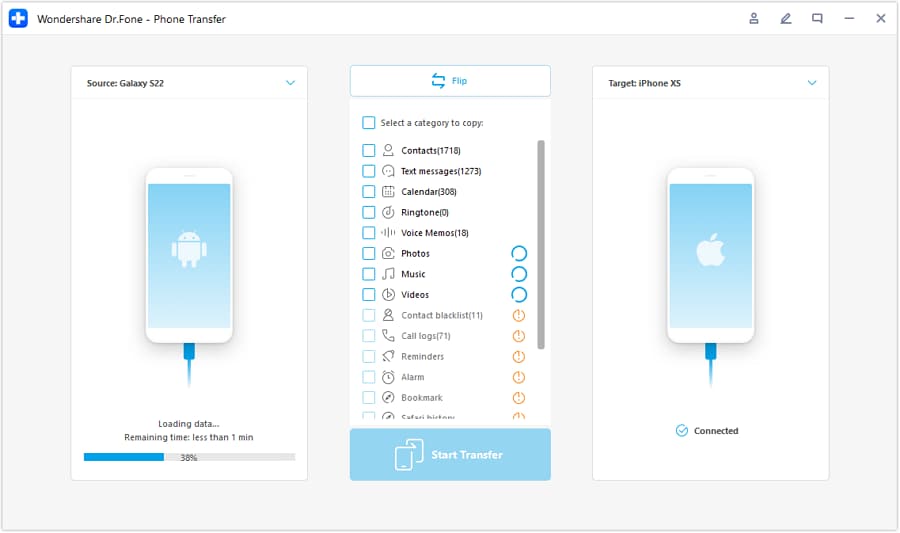
- Step 3: Set the transfer direction from Xiaomi Redmi Note 13 5G to iOS. Select the specific data types you want to transfer. Checkmark the desired items and click Start Transfer.
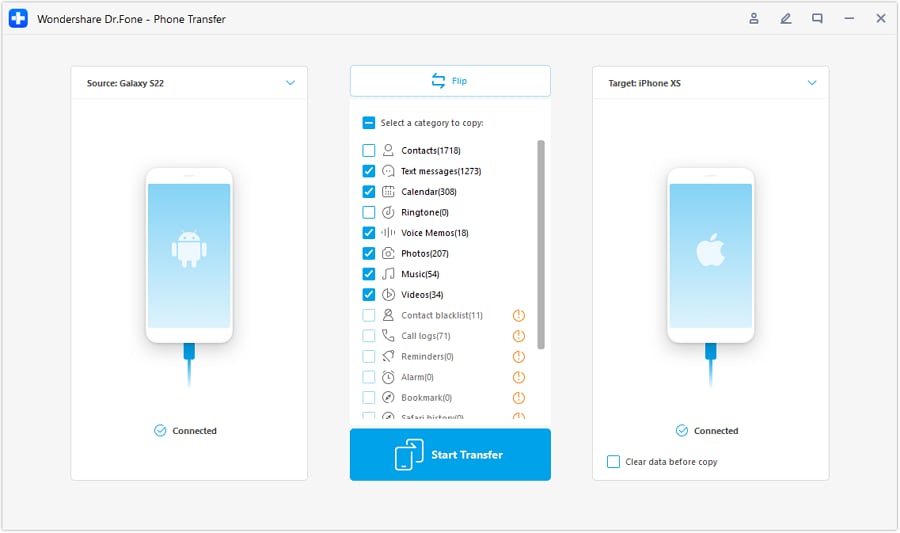
- Step 4: A new window will show the progress of the transfer. If you want to stop the operation, click Cancel.

Parental Control Software
- **Step 5:** Once completed, click **OK** to close the window.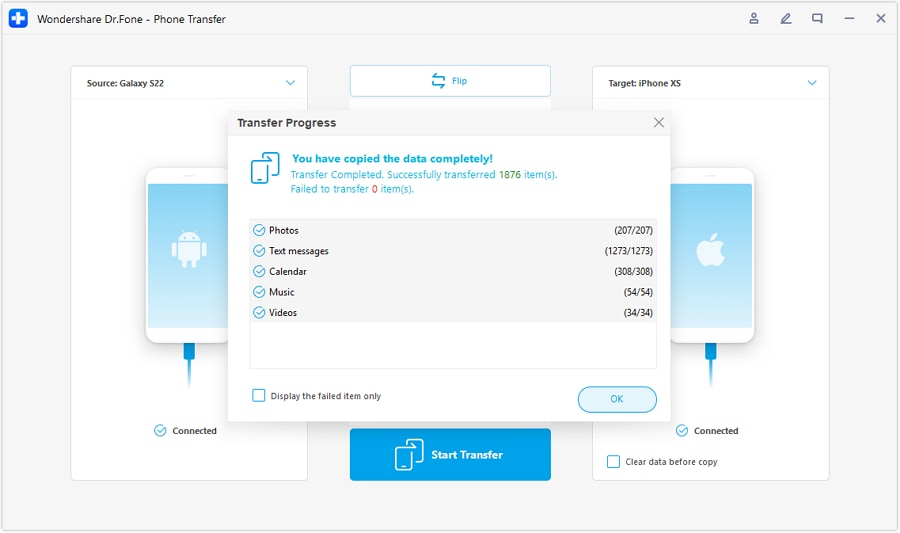
Conclusion
Navigating the digital landscape of photo organization and transfer has become increasingly vital in our fast-paced era. This article showcased various wireless methods, from iCloud to Bluetooth, and offered a step-by-step guide on how to transfer photos from phone to laptop without USB cables. As a valuable bonus, Wondershare Dr.Fone emerges as a trustworthy solution for efficiently transferring photos and files between mobile devices, ensuring a hassle-free experience. As we approach the holiday season, where memories are plentiful, having a reliable tool like Wondershare Dr.Fone can enhance the management of our digital archives, making it easier to cherish and share moments with friends and family.
How to Transfer Data After Switching From Xiaomi Redmi Note 13 5G to Latest Samsung
Have you finally gotten your hands on the latest smartphone from Samsung’s flagship Galaxy S series? Whether you have the compact S23, the slightly larger S23 Plus, or the sleek S23 Ultra, you’re in for a thrilling ride of exceptional performance and vivid graphics.
What about files on your old Android? Can you transfer data after switching from Xiaomi Redmi Note 13 5G to Samsung S23? Sure thing. We’ll walk you through the seven best methods for Android to Samsung data transfer shortly.
However, can you save all the data? Let’s find out.
Can You Save Your Data After Switching From Xiaomi Redmi Note 13 5G to Samsung S23?
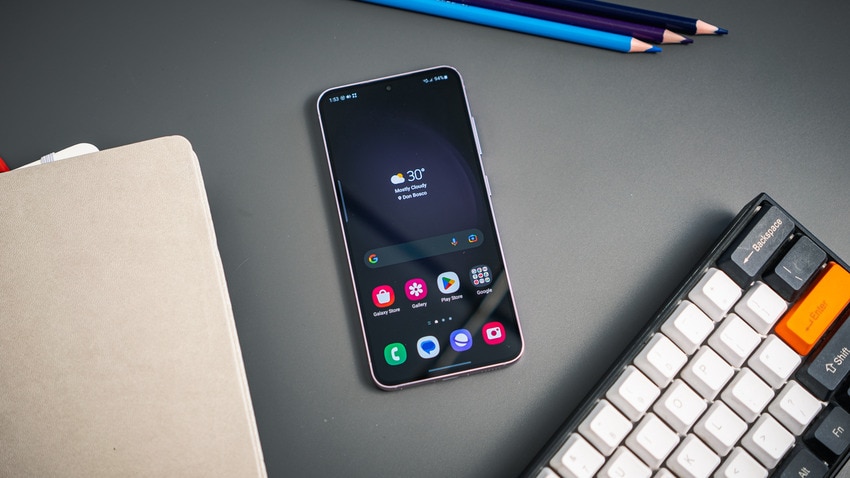
You can save all data after switching from Xiaomi Redmi Note 13 5G to Samsung S23. It doesn’t matter which Android phone you’ve used before buying the latest Samsung model because you have many data transfer options.
Samsung Smart Switch may have features exclusive to Galaxy devices (among other limitations), but all methods let you transfer data seamlessly from Xiaomi Redmi Note 13 5G to Samsung S23. Here’s how each works.
The following methods will help you move data from Xiaomi Redmi Note 13 5G to Samsung S23 within minutes. Each is straightforward, so your choice will depend on your preferences. Let’s dive in.
1. Transfer Data Using Wondershare Dr.Fone Phone Transfer
Wondershare Dr.Fone is an all-in-one phone manager offering multiple tools. Besides moving data between phones, it lets you repair your Android system, recover files and passwords, remove lock screens, and erase data. You can even transfer WhatsApp, Viber, WeChat, and LINE chats and files.
Here’s how to move data from Xiaomi Redmi Note 13 5G to Samsung S23 with Wondershare Dr.Fone:
- Download and install the app on your computer.
- Go to Toolbox > Phone Transfer.

- Connect your old Android and Samsung S23 to the computer with USB cables.
- Set the source and destination devices in Wondershare Dr.Fone Phone Transfer. The app will load data automatically.

- Select the categories to copy to Samsung S23 and click Start Transfer.
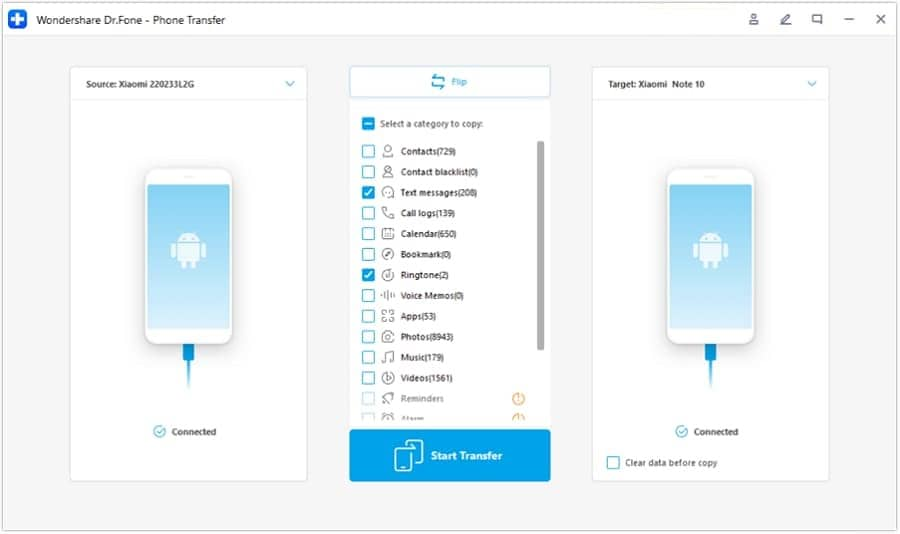
Wondershare Dr.Fone Phone Transfer lets you move apps, contacts, photos, videos, music, ringtones, text messages, voice memos, call logs, bookmarks, and calendar data between Android devices.
2. Move Data From Xiaomi Redmi Note 13 5G to Samsung Using Smart Switch
Samsung’s Smart Switch app is excellent for moving data (even settings) between Android devices. However, you can only transfer settings, memos (including voice), and app data between Galaxy phones.
Also, you can’t transfer apps you haven’t downloaded from the Play Store or encrypted data like WhatsApp chats. Wondershare Dr.Fone is better if you don’t want to lose your IM conversations.
Here’s how to move data from Xiaomi Redmi Note 13 5G to Samsung S23 with Smart Switch:
- Download and install Smart Switch on both phones and place them next to one another.
- Get your Samsung S23 and go to Settings > Accounts and backup > Bring data from an old device.
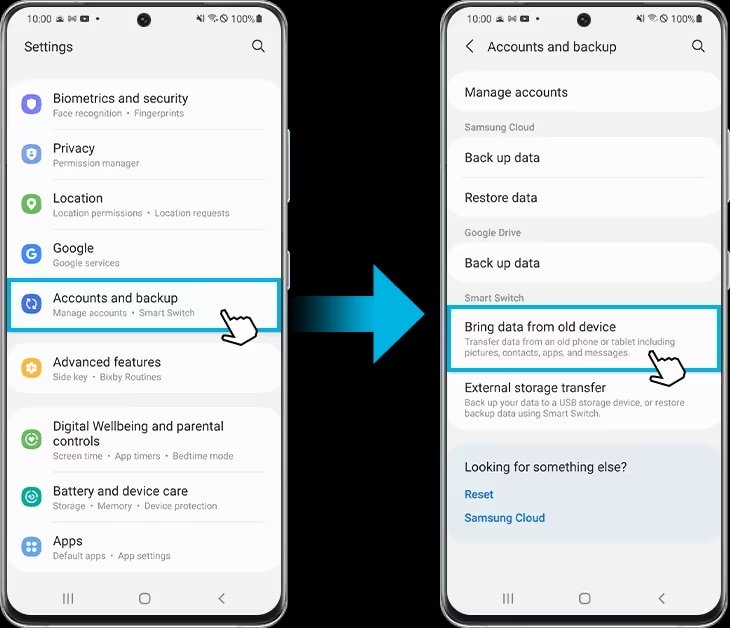
- On your Samsung S23, tap Receive dataand choose Galaxy/Android as the source.
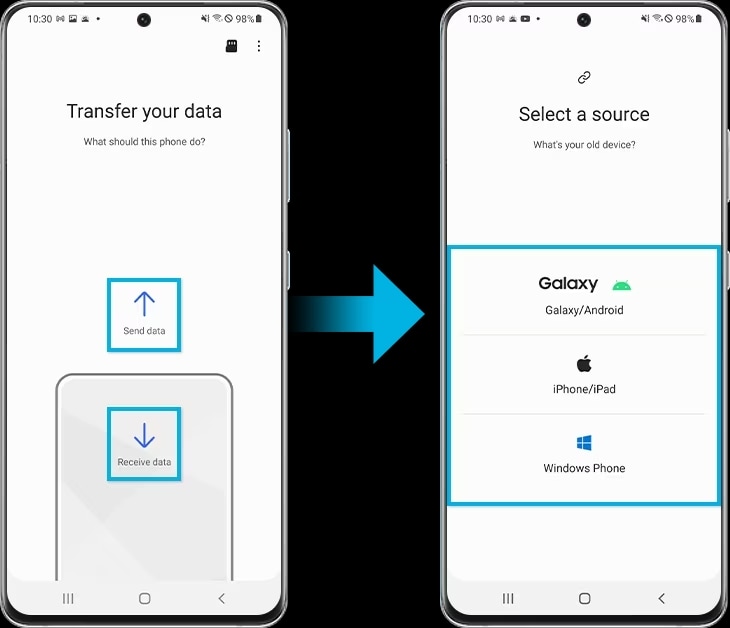
- Tap Send dataon your old phone and select Wireless (it’s faster than a cable connection). Tap Allow to enable data access.
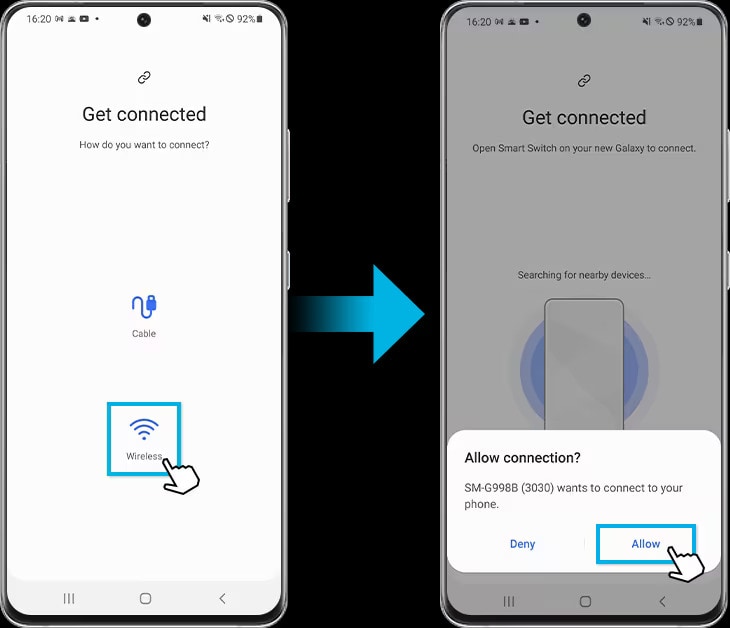
- Choose the desired data using your Samsung S23, tap Transfer, then Go to the Home screenonce everything is on your new phone.
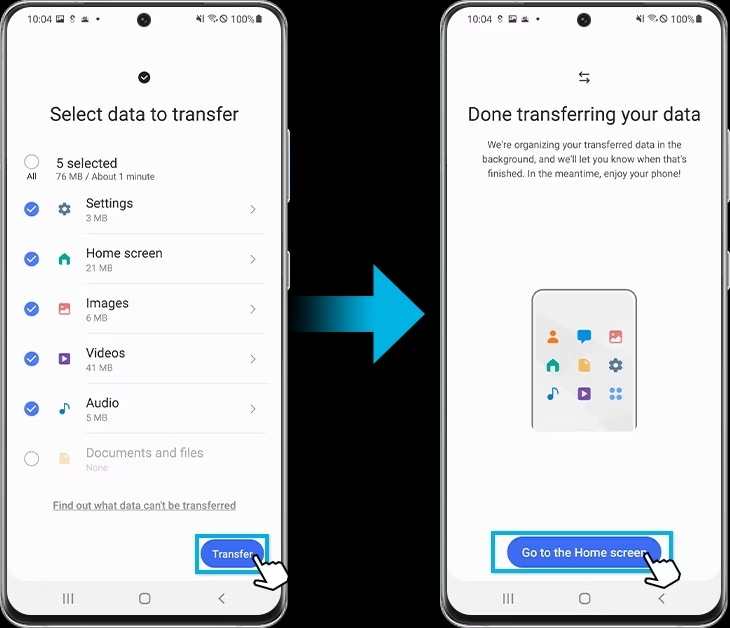
Remember to charge both phones before transferring data or connect them to a power source to ensure the process goes smoothly.
3. Transfer Data Using Google Account Sync
Backing up your Google Account data with Google One means accessing it on any device upon login. The backup includes apps, phone settings, messages, calls, photos, videos, and your chosen Google Account data (e.g., contacts, calendar, emails, and documents).
Here’s how to transfer data to Samsung Galaxy S23 using Google Account synchronization:
- Go to Settings > Google > Backup > Google Account dataon your old Android phone and toggle on the desired switches for synchronization.
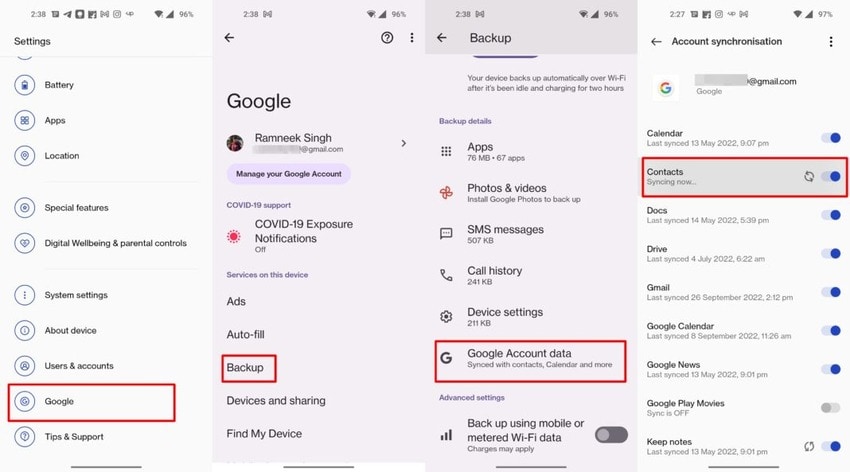
- On your Samsung S23, go to Settings > Googleand log into your backed-up Google Account.
Everything you’ve previously backed up will automatically sync once you log into your Google Account.
4. Share Data via Bluetooth
Bluetooth may be slower than most data-sharing methods, but its reliability is why we never have to imagine life without it. It may not support transferring settings or downloaded apps, but it’s excellent for moving all your photos, videos, music, and other files.
Here’s how to share data between Android and Samsung S23 via Bluetooth:
- Go to Settings > Connectionsand toggle on the Bluetooth switch on both phones. Alternatively, use a shortcut in the Notification panel.
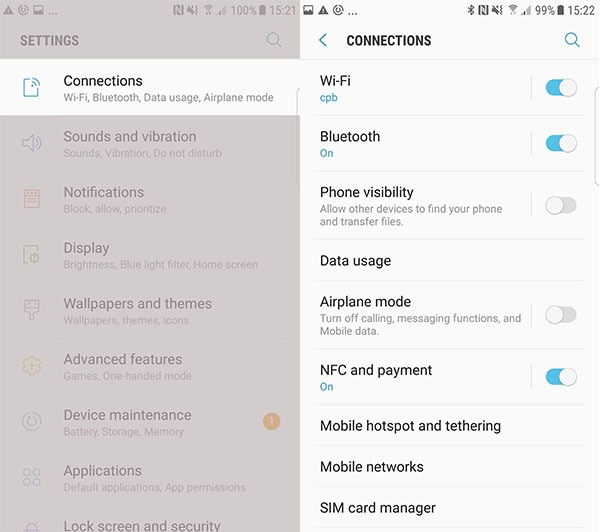
- Pair the phones and select folders or files you wish to transfer to your Samsung Galaxy S23.
- Tap Share > Bluetoothand choose your new phone.
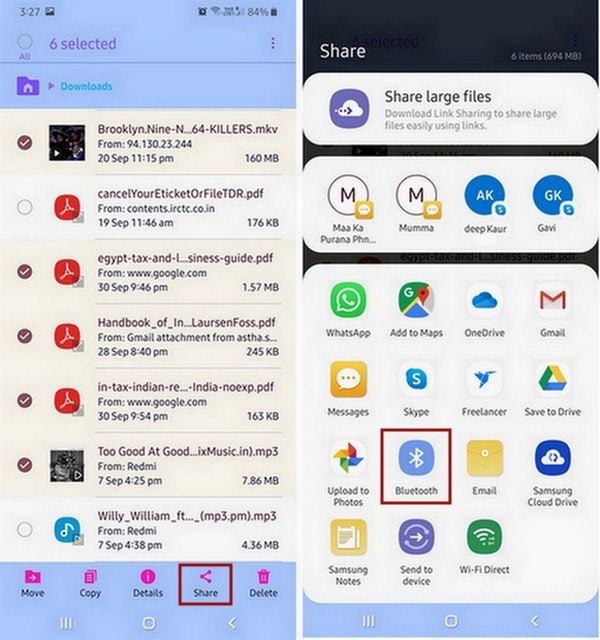
Key features:
• Import from any devices and cams, including GoPro and drones. All formats supported. Сurrently the only free video editor that allows users to export in a new H265/HEVC codec, something essential for those working with 4K and HD.
• Everything for hassle-free basic editing: cut, crop and merge files, add titles and favorite music
• Visual effects, advanced color correction and trendy Instagram-like filters
• All multimedia processing done from one app: video editing capabilities reinforced by a video converter, a screen capture, a video capture, a disc burner and a YouTube uploader
• Non-linear editing: edit several files with simultaneously
• Easy export to social networks: special profiles for YouTube, Facebook, Vimeo, Twitter and Instagram
• High quality export – no conversion quality loss, double export speed even of HD files due to hardware acceleration
• Stabilization tool will turn shaky or jittery footage into a more stable video automatically.
• Essential toolset for professional video editing: blending modes, Mask tool, advanced multiple-color Chroma Key
Sharing data via Bluetooth may take a while, but this valuable feature will bring everything you need to your new smartphone.
5. Use Google Drive
Google Drive is a prominent cloud storage and file-sharing platform. You’re missing out if you don’t use it. It lets you synchronize data across devices, access files in the cloud, and create presentation slides, spreadsheets, forms, and documents (online and offline).
Transferring data from Xiaomi Redmi Note 13 5G to Samsung S23 is seamless with Google Drive. Here’s what to do:
- Launch Google Drive on your old Android and tap New > Upload. The Newbutton features only a plus sign on some devices.
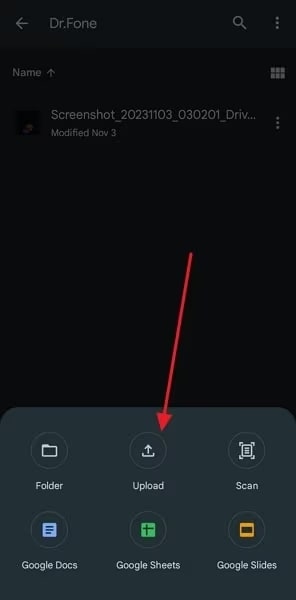
- Add all folders or files you wish to transfer to your new phone.
- Open Google Drive on your Samsung S23 and sign into the correct account.
- Select the uploaded data, tap the kebab menu(the three vertical dots in the top right corner), and hit Download.
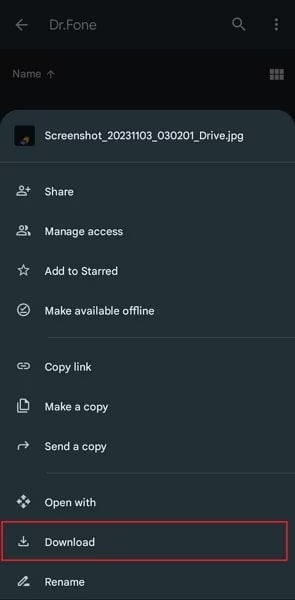
6. Transfer Data Using a USB Cable
USB cables—the unsung heroes of connectivity. Like Bluetooth and Wi-Fi, we can’t imagine life without them. They’re perfect for transferring data between devices.
However, in this instance, we don’t mean the traditional data transfer between your phone and computer (we’ll get to that shortly). This trick involves connecting your old Android phone to your new Samsung Galaxy S23 with a USB cable.
It’s almost like Samsung’s Smart Switch, except you don’t need to download an app and can move more data. You can transfer everything from your old Android device’s internal storage to your new smartphone. Here’s how:
- Connect your phones using a USB-C to USB-C cable. Your Samsung Galaxy S23 came with it.
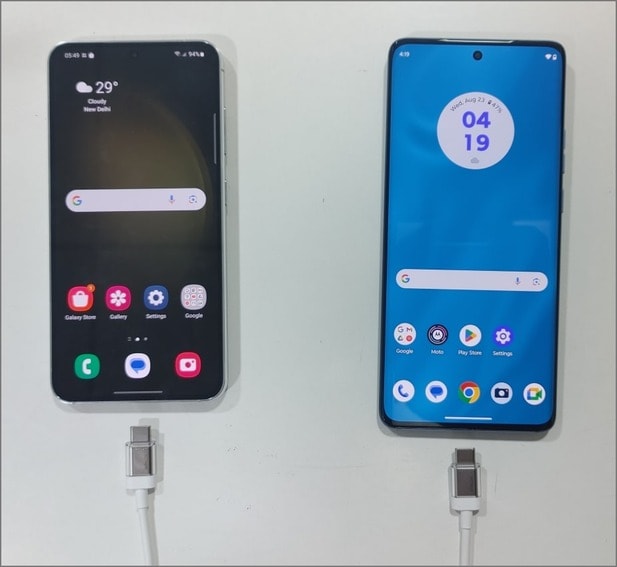
- Tap Connected to Androidon your Galaxy S23 phone and select MTP Host (Media Transfer Protocol).
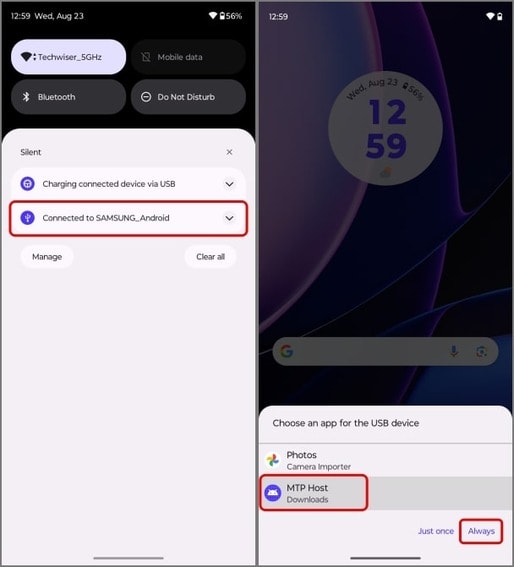
- Tap Allowon your old Android to enable data access.
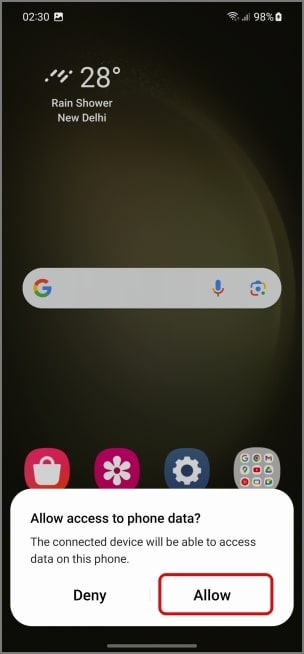
- Choose the desired file manager on your new phone and browse your old Android’s internal storage.
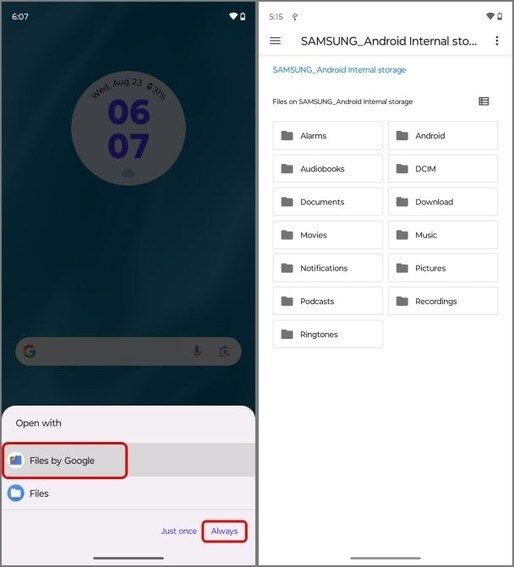
- Choose folders or files to transfer, tap the kebab menufor more options, and select Copy to.
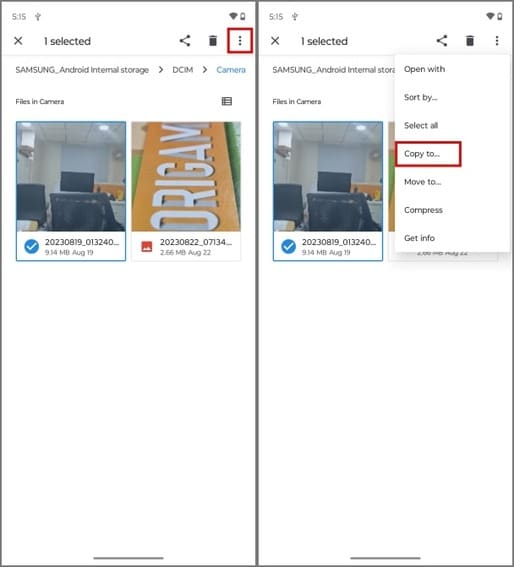
- Pick any location on your Samsung S23 phone (e.g., the Downloadsfolder for quick access) and tap Copy.
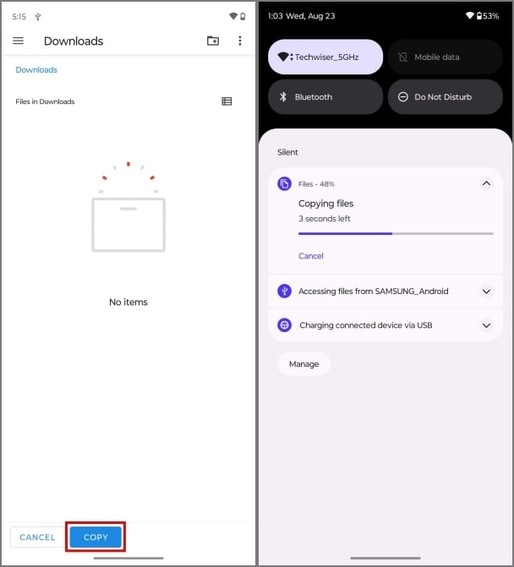
Moving data between phones using a USB cable is faster than Bluetooth but offers the same functionality. However, charge your devices beforehand because the data transfer may take a while (if you have many sizable files).
 EmEditor Professional (Lifetime License, non-store app)
EmEditor Professional (Lifetime License, non-store app)
7. Use an SD Card
We can almost see you fumbling with your Samsung S23, looking for an SD or microSD card slot. Newsflash: there isn’t one. Like its predecessors, S21 and S22, the Galaxy S23 series doesn’t support expandable storage.
How can you transfer data from an SD card, then? Well, there’s always your computer. You can migrate your SD card data to your desktop or laptop before moving it to your new Galaxy phone.
It may not be as straightforward as the methods above, but it’s ideal for keeping precious files from your old Android’s SD card. Here’s what to do:
- Select the desired files or folders on your old Android, tap Move, and choose your SD card.
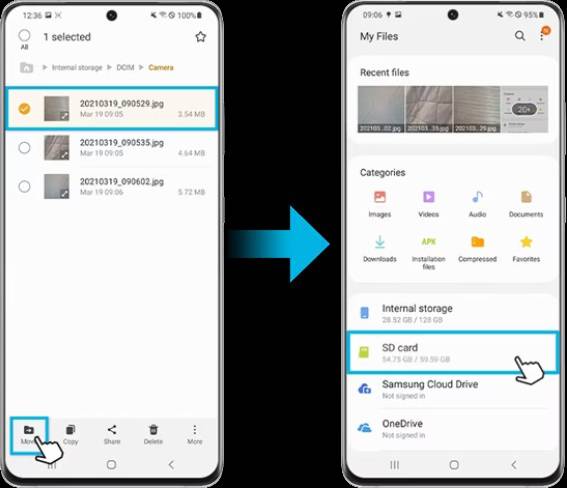
 Power Tools add-on for Google Sheets, Lifetime subscription
Power Tools add-on for Google Sheets, Lifetime subscription
- Connect the Android to your computer with a USB cable.
- Tap USB for file transferin the Notification panel and select Transferring files / Android Auto.
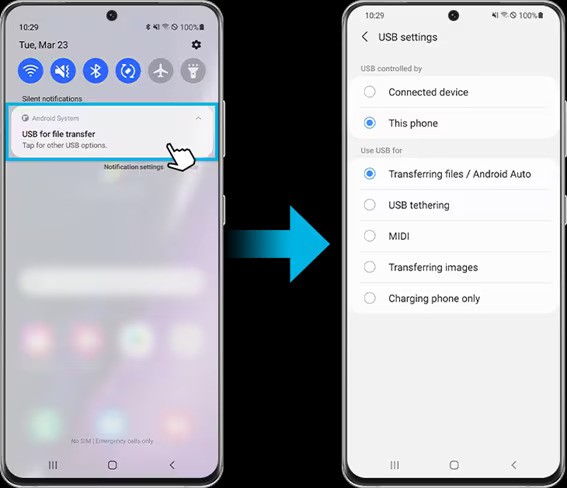
- Go to This PCin File Explorer and open your phone under Devices and drives.
- Right-click the folders or files you wish to move, select Copy, and paste them to any location on your computer.
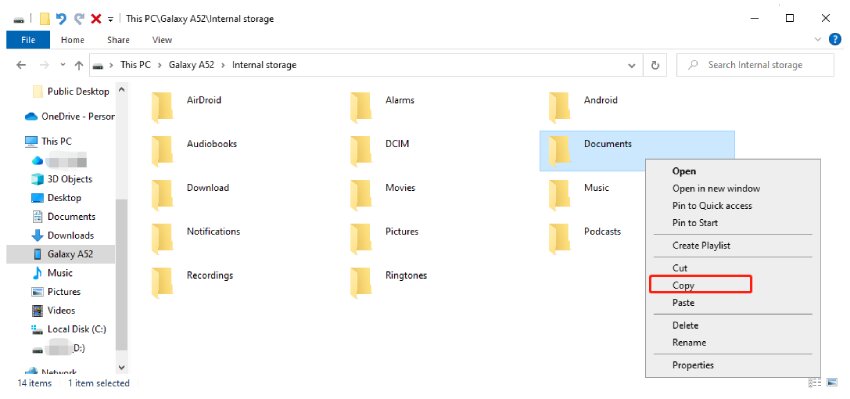
- Once you move the data, safely disconnect your old Android and connect your Samsung S23 to the PC.
- Go to the folder with your newly saved data and copy-paste it to your Samsung S23.
This method is best for transferring photos, videos, and other files from an SD card you might not use anymore. After all, smartphone manufacturers increasingly ditch SD card slots for sleek, more compact designs.
Conclusion
Switching from Xiaomi Redmi Note 13 5G to Samsung S23 is a breeze because you have many data transfer options. Besides Samsung’s Smart Switch, you can use your synced Google Account, Google Drive, Bluetooth, or a USB-C to USB-C cable. You can also migrate data from your old Android SD card to your computer before transferring it to your new phone.
However, Wondershare Dr.Fone Phone Transfer might be your best option. Besides transferring files, it features many tools for seamless phone management, making it a fantastic addition to your digital toolbox.
- Title: How to Migrate Android Data From Xiaomi Redmi Note 13 5G to New Android Phone? | Dr.fone
- Author: Nova
- Created at : 2024-08-30 01:12:54
- Updated at : 2024-08-31 01:12:54
- Link: https://blog-min.techidaily.com/how-to-migrate-android-data-from-xiaomi-redmi-note-13-5g-to-new-android-phone-drfone-by-drfone-transfer-from-android-transfer-from-android/
- License: This work is licensed under CC BY-NC-SA 4.0.



 LYRX is an easy-to-use karaoke software with the professional features karaoke hosts need to perform with precision. LYRX is karaoke show hosting software that supports all standard karaoke file types as well as HD video formats, and it’s truly fun to use.
LYRX is an easy-to-use karaoke software with the professional features karaoke hosts need to perform with precision. LYRX is karaoke show hosting software that supports all standard karaoke file types as well as HD video formats, and it’s truly fun to use.




 vMix Pro - Software based live production. vMix Pro includes everything in vMix 4K plus 8 channels of Replay and 8 vMix Call
vMix Pro - Software based live production. vMix Pro includes everything in vMix 4K plus 8 channels of Replay and 8 vMix Call Simple and intuitive video editing
Simple and intuitive video editing
 vMix Basic HD - Software based live production. vMix Basic HD includes 4 inputs, 3 cameras, streaming, recording, playlist.
vMix Basic HD - Software based live production. vMix Basic HD includes 4 inputs, 3 cameras, streaming, recording, playlist.

 Forex Robotron Gold Package
Forex Robotron Gold Package